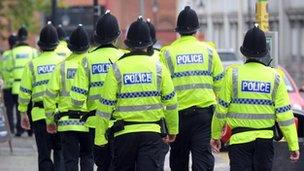Police numbers are at lowest for 11 years - Home Office
- Published

In July, figures showed police officer numbers had hit their lowest level in nine years
Police officer numbers in England and Wales have fallen to their lowest level in 11 years, the Home Office has said.
Officers in the 43 forces stood at 131,837 at the end of September 2012, revealing a drop of more than 4,000 in a year - newly released figures show.
Policing Minister Damian Green said police reforms were working, crime was down and public confidence was up.
But Labour's Yvette Cooper said cuts were making it harder for officers to "catch criminals and deliver justice".
According to the figures - which are released twice a year by the government - police officer numbers are at their lowest since 2002 and have fallen by more than 12,500 since the coalition came to power.
Dorset and Warwickshire, where police officer numbers fell 5.9% to 1,337 and 5.9% to 827 respectively, have seen the biggest drop.
Surrey was the only force where officer numbers have increased, with a 1% rise of 20 officers to 1,981.
However, Surrey had intended to increase constable numbers after undergoing reductions between 2006 and 2009.
'Not surprising'
The number of police staff has also dropped by 3,406 to 65,992 - a fall of 4.9% - according to the figures.
Figures for police community support officers fell by 1,070 to 14,411 - or 6.9% - in a year, while the number of special constables, who are volunteers, saw a 1.3% drop by 248 to 19,159.
The news comes amid a series of government reforms to police forces, which have included 20% budget cuts and a £4,000 pay cut for new starters.
Mr Green defended the numbers, saying: "Our police reforms are working, crime is down 10% under this government and public confidence is up.
"We set the police a challenge - to cut crime while playing their part in reducing the country's record deficit."
He added: "Thanks to the efforts of officers, the leadership of chief constables and our radical reform of policing that challenge is being met."
'Denied justice'
But shadow home secretary Ms Cooper said with fewer police on the streets "fewer crimes [were] being solved".
"The home secretary is completely out of touch with communities," she said.
"Thousands more victims are being denied justice, thousands more criminals are getting away with it, yet Theresa May thinks this is a good time to cut thousands more police."
Ms Cooper also called on the government to "urgently rethink next year's police budget cuts and stop letting communities down".
Peter Fahy, the Association of Chief Police Officers' lead on workforce development, said the reductions were "not surprising" following "substantial cuts" to police budgets.
Sir Peter, who is Chief Constable of Greater Manchester Police, said the service had "risen to the challenge of dealing with significant financial cuts and reform", while maintaining the protection of the public.
Steve Williams, chairman of the Police Federation of England and Wales, said: "The government must question whether a reduced police service that operates only on a cost basis is what the public expects.
"Effective policing encompasses much more than solving crime. Areas such as road traffic accidents, mental health incidents, missing persons, intelligence gathering and simply providing visible safety and reassurance to the local community are equally important and officer dependent."
The federation, which represents rank and file officers, added that the gap in police officer numbers per head of the population was rising.
- Published13 January 2013
- Published14 January 2013
- Published30 January 2013
- Published30 March 2011
- Published26 July 2012
- Published2 July 2012
- Published21 September 2011